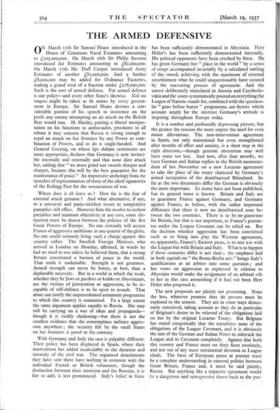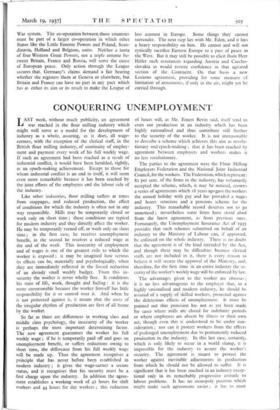THE ARMED DEFENSIVE
ON March nth Sir Samuel Hoare introduced in the House of Commons Naval Estimates amounting to £105,000p00. On March i6th Sir Philip Sassoon introduced Air Estimates amounting to £82,000,000. On March r7th Mr. Duff Cooper introduced Army Estimates of another L82,000,000. And a further L8,000,000 may be added for Ordnance Factories, making a grand total of a fraction under £278,000,000. Such is the cost of armed defence. For armed defence is our policy—and every other State's likewise. Noli me tangere might be taken as fit motto by every govern- ment in Europe. Sir Samuel Hoare devotes a con- siderable portion of his speech to insistence on the perils any enemy attempting an air attack on the British fleet would run. M. Maisky, putting a liberal interpre- tation on his functions as ambassador, proclaims to all whom it may concern that Russia is strong enough to repel an attack on her frontiers by any Power or com- bination of Powers, and to do it single-handed. And General Goering, on whose lips defiant sentiments are more appropriate, declares that Germany is now invinci- ble internally and externally and that none dare attack her, adding that "we must grind our swords sharper and sharper, because this will be the best guarantee for the maintenance of peace." An impressive anthology from the speeches of representatives of three of the chief signatories of the Kellogg Pact for the renunciation of war.
Where does it all leave us ? How far is the fear of external attack genuine ? And what alternative, if any, to a universal and panic-stricken resort to competitive panoplies still offers. However firm the resolve to eschew prejudice and maintain objectivity at any cost, some dis- tinction must be drawn between the policies of the five Great Powers of Europe. No one certainly will accuse France of aggressive ambitions in any quarter of the globe. No one could seriously bring such a charge against this country either. The Swedish Foreign Minister, who arrived in London on Monday, affirmed, in words he had no need to use unless he believed them, that a strong Britain constituted a bastion of peace in the world. That truth is undeniable. Strength is not greatness. Armed strength can never be better, at best, than a deplorable necessity. But in a world in which the weak, whether they be Jews or pacifists or kulaks or Abyssinians, are the victims of persecution or aggression, to be in- capable of self-defence is to lie open to assault. That alone can justify the unprecedented armament programme to which this country is committed. To a large extent the same argument applies equally to Russia. She may still be carrying on a war of ideas and propaganda— though it is visibly slackening—but there is not the smallest evidence that she contemplates military aggres- sion anywhere ; the security felt by the small States on her frontiers is proof to the contrary With Germany and Italy the case is palpably different. Their policy has been displayed in Spain, where their intervention has added incalculably to the duration and intensity of the civil war. The organised detachments they have sent there have nothing in common with the- individual French or British volunteers; though the distinction between their intrusion and the Russian, it is- fair to add, is less pronounced. Italy's belief in force has been sufficiently demonstrated in Abyssinia. Herr Hitler's has been sufficiently demonstrated internally. His political opponents have been crushed by force. He has given Germany her "place in the world" by a series of coups accompanied invariably by a calculated rattling of the sword, achieving with the maximum of external unsettlement what he could unquestionably have secured by the reassuring process of agreement. And the unrest deliberately stimulated in Austria and Czechoslo- vakia and the scorn systematically poured on everything the League of Nations stands for, combined with the spectacu- lar "guns before butter" programme, are factors which account amply for the mistrust Germany's attitude is inspiring throughout Europe today.
It is a sombre and profoundly depressing picture, but the greater the tension the more urgent the need for even minor alleviations. The non-intervention agreement in Spain, not only maintained but even strengthened after months of effort and anxiety, is a short step in the right direction,—though genuine abstention may well have come too late. And now, after four months, we have German and Italian replies to the British memoran- dum of last November on a new Locarno agreement to take the place of the treaty shattered by Germany's armed occupation of the demilitarised Rhineland. So far as the two documents differ the German is obviously the more important. Its terms have not been published, but its general tenor is known. Britain and Italy are to guarantee France against Germany, and Germany against France, as before, with the rather important difference that there is now no demilitarised zone be- tween the two countries. There is to be no guarantee for Britain, but that is not important, as France's guaran- tee under the League Covenant can be relied on. But the decision whether aggression has been committed such as to bring into play the Western agreement, or, apparently, France's Eastern pacts, is to rest not with the League but with Britain and Italy. What is to happen if those countries differ is not clear ; the emphasis laid in both capitals on " the Rome-Berlin axis" brings Italy's qualifications as an arbiter into some question ; and her views on aggression as expressed in relation to Abyssinia would make the assignment of an arbitral role to her in this case astonishing if it had not been Herr Hitler who proposed it.
The new proposals are plainly not promising. None the less, whatever promise they do possess must be explored to the utmost. They are in some ways dexter- ously conceived, taking account as they do in particular of Belgium's desire to be relieved of the obligations laid on her by the original Locarno Treaty. But Belgium has stated categorically that she repudiates none of the obligations of the League Covenant, and it is obviously the aim of the German and Italian Notes- to sidetrack the League and its Covenant completely. Against that both this country and France must set their faces resolutely, and not out of any mere sentimental devotion to League ideals. The basis of European peace at present must be a complete understanding in external politics between Great Britain, France and, it must be said plainly, Russia. But anything like a tripartite agreement would be a dangerous and retrogressive throw-back to the pre- War system. The co-operation between those countries must be part of a larger co-operation in which other States like the Little Entente Powers and Poland, Scan- dinavia, Holland and Belgium, unite. Neither a junta of four Western Great Powers, nor a triple entente be- tween Britain, France and Russia, will serve the cause of European peace. Only action through the League secures that. Germany's claims demand a fair hearing whether she registers them at Geneva or elsewhere, but Britain and France can have no part in any pact which has as either its aim or its result to make the League of less. account 'in Europe. Some things they cannot surrender. The next step lies with Mr. Eden, and it lays a heavy responsibility on him. He cannot and will not cynically sacrifice Eastern Europe to a pact of peace in the West. But it may still be possible to elicit from Herr Hitler such assurances regarding Austria and Czecho- slovakia as would restore confidence in that agitated section of the Continent. On that basis a new Locarno agreement, providing for some measure of limitation of armaments, if only in the air, might yet be carried through.





































































 Previous page
Previous page